A comedy that takes 'Thelma & Louise' and takes them from 'Hangover to Vegas'
Laura Mañá directs the film 'Las irresponsables', with a trio of protagonists who plot a crazy revenge.


BarcelonaThey call themselves "the three Marias: poop, shit, and trash." Lila, Andrea, and Núria don't need to explain any chapter of their lives because they've shared them all, even if they've taken very different paths. Now they're crossing fifty, and each one is in crisis in their own way. The one who's in the worst situation—because things are always worse—is Lila, who has separated and spends her days tracking her ex's location on her phone. To console her, the friends agree to spend a weekend at an incredible house that Núria's new Italian vibe has given them.
The irresponsible ones It is the adaptation by Laura Mañá and Marta Buchaca of a play written by Javier Daulte and premiered at La Villarroel in 2021, directed by Sílvia Munt and featuring a different cast. The script has two unusual features: it only features women as protagonists, and they are not what we would call youths. "The last movie I saw about women going away for a weekend I think was Thelma and Louise – Mañá observes – I wanted to show that women can be funny, that they can take off the responsibility that society places on them. We're used to seeing funny movies like Hangover in Las Vegas And we find it perfectly normal for men to do crazy things, but women, not so much; they always have to be measured." "Women always find ourselves having to do everything right, that we can't let others down, we also carry the weight of relationships, and we don't talk about the role of mothers," adds Laia Marull. The irresponsible ones, the three friends – played by Laia Marull, Àgata Roca and Betsy Túrnez – will plot three crazy revenge plots to do poetic justice against the patriarchy and against the men who have scorned them.
What do women do when they are alone?
Female friendship is one of those strongholds that has been rarely portrayed in comedy. The irresponsible ones clearly looking for laughter but avoiding the cliché boy or of the TupperwareMañá wanted to portray groups of friends who reunite in later life and make time to do activities, chat, and laugh. "Friendship between women has been mistreated because we've been told we're competitive and critical, and I don't agree. We need to stop talking badly about ourselves," says the director. It's also true that, beyond youth, life's complications often make it difficult to prioritize friendships: "It's a little sad. We're at a time when it's hard to find each other, and we rarely allow ourselves quiet moments with friends without any other plans," says Marull.
The protagonists represent three profiles of women who assume three roles that are difficult for them to break: the one for whom everything goes wrong, the fighter who always acts strong, and the single woman embittered by her loneliness. Marull, dressed in pajamas, has the most dramatic role in this heartbreaking comedy: "We all have a label and over the years you believe it, you become enchanted, and we often forget who we could be, we could be many other things. irresponsible person we carry inside," reflects the actress. For Marull, friendship is crucial because it functions as a mirror. "It gives you the version of yourself that you aren't seeing because you are blinded by your miseries or your way of being. The friend is the person who doesn't judge you, who likes you as you are and who knows you best, and if they put their finger on the wound, they are the one who can change you the most. Because the friend doesn't love you." After all, the film also addresses the need to live life together.
The house is the fourth character in the film, another mansion near the sea that joins the luxury homes of recent Catalan cinema, this one in Sant Andreu de Llavaneres. "They, rich as shit, and we eating shit," says Àgata Roca's character, in one of the scatological gags of the film. "The house held a casting, like the actresses," says the director about that paradisiacal place full of works of art that will be revealed as an immoral space. "It's a liberating weekend because they say 'up to here'," says Mañá. "We have disheveled", says Marull.
